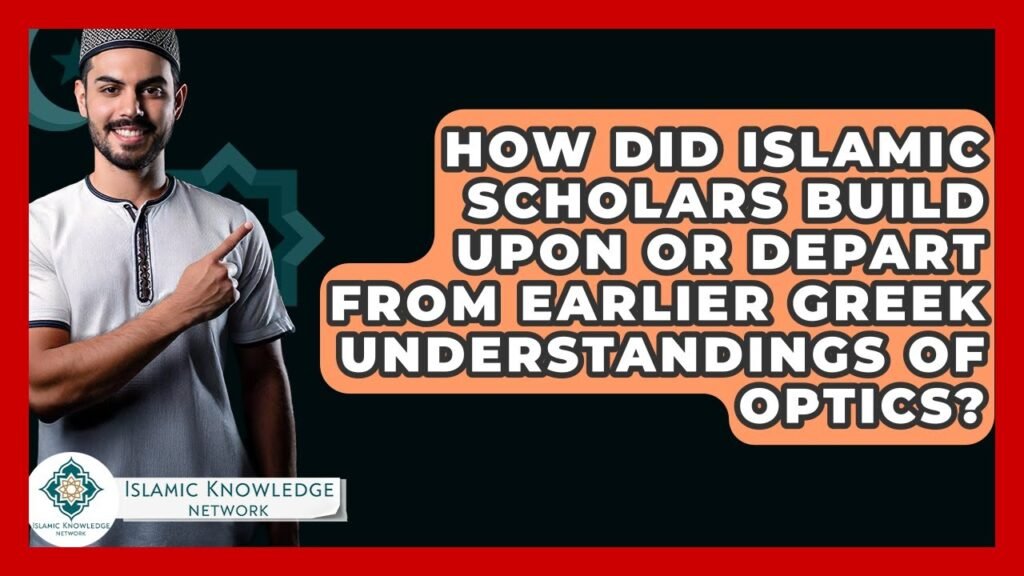Disclaimer:
The content published on this website is provided for general informational purposes only. Articles are generated with the assistance of artificial intelligence and are reviewed periodically; however, accuracy cannot be guaranteed in all cases. Readers are encouraged to verify important information from reliable and authoritative sources before relying on it. The website does not intend to mislead, and any errors found will be corrected when identified.
How Did Islamic Scholars Build Upon or Depart From Earlier Greek Understandings of Optics?
The realms of science and philosophy witnessed significant transformations during the Islamic Golden Age, particularly in the field of optics. While Greek scholars like Euclid and Ptolemy laid foundational theories about light and vision, Islamic scholars such as Ibn al-Haytham expanded upon these ideas, embarking on rigorous experimentation and observation. This discourse examines how these Islamic thinkers not only preserved but also enhanced the Greek understanding of optics through their innovative approaches, leading to groundbreaking advancements in the field.
As we delve into the intricacies of this intellectual journey, it becomes clear that the synthesis of Greek knowledge with Islamic thought catalyzed remarkable developments that would influence future generations. Just as these scholars meticulously built upon the past, we at Airlink Hajj and Umrah are committed to providing you with the most updated insights about the sacred journeys of Hajj and Umrah. Explore our blog for the latest updates and resources, and join us in celebrating the rich tapestry of knowledge that continues to inspire and guide us today.
How Did Islamic Scholars Innovate Greek Optics Understanding?
Islamic scholars of the medieval period made significant contributions to the field of optics, building upon the foundational work of Greek philosophers like Euclid and Ptolemy. By the 9th century, scholars such as Al-Kindi began to reinterpret and expand upon Greek theories, particularly through systematic experimentation and observation. This laid the groundwork for advancements that would shape the study of light and vision.
Perhaps the most notable figure in this innovation was Ibn al-Haytham, also known as Alhazen. His seminal work, the Book of Optics, sought to understand how light interacts with objects and how it is perceived by the human eye. Unlike his Greek predecessors, who often relied on philosophical reasoning, Ibn al-Haytham emphasized empirical methods, conducting experiments with lenses and mirrors. His investigations led to the formulation of key principles, including the understanding of refraction and the role of the eye’s anatomy in vision.
These explorations not only advanced mathematical optics but also influenced later Western scholars during the Renaissance. At Air Link Hajj and Umrah, we celebrate such intellectual heritage while keeping you updated on Hajj and Umrah experiences that reflect centuries of Islamic scholarship and culture. Stay tuned to our blog for the latest insights and updates!
FAQ on How Did Islamic Scholars Innovate Greek Optics Understanding?
-
What contributions did Islamic scholars make to the field of optics?
Islamic scholars built upon and expanded Greek concepts of optics, introducing new techniques in experimentation, geometric analysis, and the study of light’s behavior, particularly reflection and refraction. -
Who were some key Islamic scholars in optics?
Notable figures include Ibn al-Haytham (Alhazen), who is often regarded as the "father of optics," and Al-Farabi, who also contributed to the understanding of vision and light. -
What was the impact of the Book of Optics by Ibn al-Haytham?
The Book of Optics synthesized earlier knowledge, providing a rigorous experimental approach and laying the groundwork for future studies in vision, light behavior, and the development of optical instruments.
-
How did Islamic scholars differ from their Greek predecessors in their study of optics?
Islamic scholars employed empirical methods and systematic experimentation, whereas Greek scholars often relied more on philosophical reasoning without extensive experimental validation. - What long-term effects did Islamic innovations in optics have on science?
The advancements made by Islamic scholars significantly influenced the Renaissance and the development of modern optics, shaping future explorations in physics, astronomy, and optical technology.
Mushu, an experienced Saudi Arabia traveler and writer, shares insightful tips and spiritual reflections to enhance Hajj and Umrah journeys for fellow pilgrims. He has been to Makkah and Madina from 2016 to 2023 many times and his posts will reflect this.







